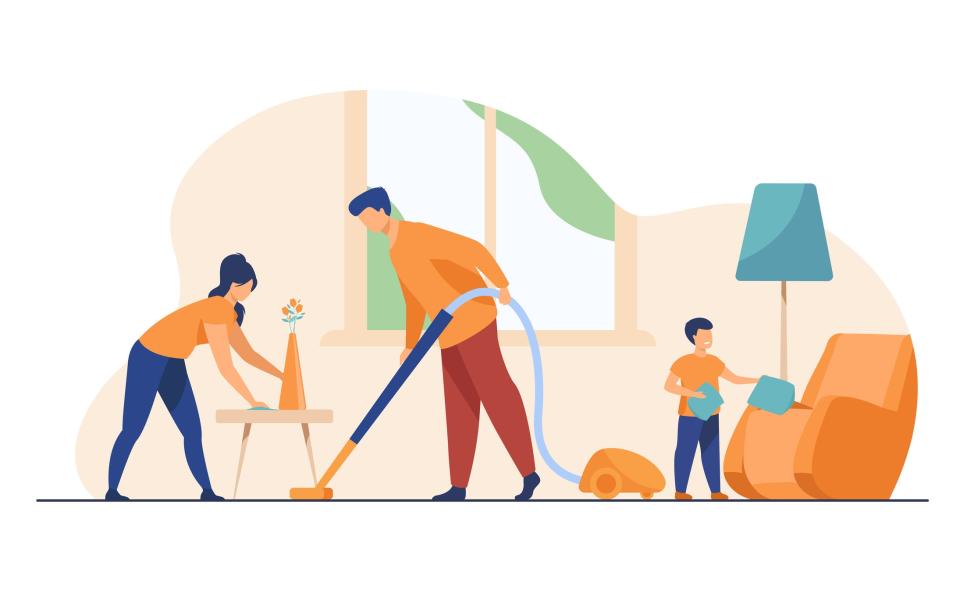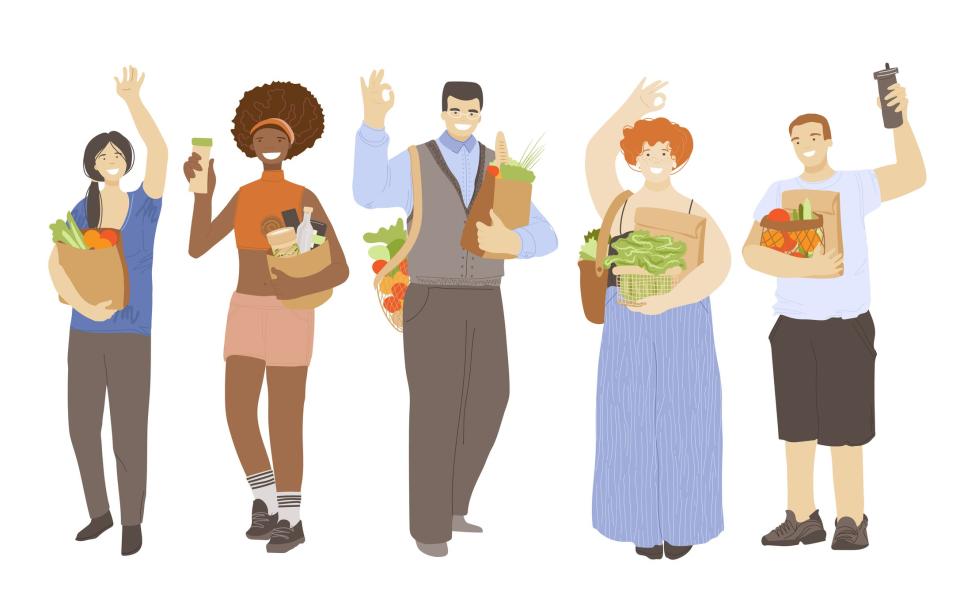Decluttering and learning to say no: Small changes to help you beat the January lockdown blues

New year, new you. It’s a phrase we hear far too many times every January, as millions of people set out to drastically transform their lives at the beginning of the month, only to find themselves abandoning their ambitious plans just a few weeks later.
According to YouGov, only one in four (24 per cent) Britons actually stick to the new year’s resolutions they set themselves. There are various reasons for this, but the main one is simply that people are too ambitious. And yet every year, the most popular new year’s resolutions that people make in the UK recur.
For the second year in a row, health improvements have dominated people’s resolutions, with “improving fitness” coming in at number one, while “losing weight” and “improving my diet” follow in second and third place, consecutively.
Then it’s on to equally overzealous promises such as “saving more money”, “pursuing a career ambition” and “cutting down on drinking”. These are all noble goals, of course, but they are vague. And, given how often we’re bombarded with advertising campaigns promoting such messages at the start of every year, these goals have become somewhat meaningless, which can make them harder to achieve than more specific targets.
This is just one of the reasons why personal growth experts advise against setting yourself major new year’s resolutions, and instead focusing on simpler and more specific ones that you’ll be more likely to achieve. Because while the pandemic means we might all be spending more time at home, that doesn’t mean we necessarily have more capacity to take on new challenges. In fact, we probably have less.
“Some people may feel guilty that they haven’t spent their time in lockdown wisely after seeing others learn a new language or get into shape,” says Kevin Scheepers, personal growth specialist.
“After the year we have had, setting goals can be hard on anyone but it is never too late to start something new.”
Scheepers’ approach to meeting new year’s resolutions is described by the following acronym: MADE, or minimal actions for desired effects.
“This method can make those goals easier to reach,” he explains. “People need to be realistic when committing to new things as it is no easy feat. It is easy for people to think they can run before they can walk so taking small effective steps from the start is the best way to see long-term changes you want.”
So what small changes could you make in 2021? Here are our suggestions.
Decluttering
Don’t underestimate the mental benefits of living in a clean and organised space, says Lizzie Grant, founder of organisation site Declutter on Demand and self-proclaimed professional organiser. Decluttering is a great new year’s resolution, not least because, come January, most people will be taking down their Christmas decorations.
“A wardrobe is a good place for many to start as it’s sometimes easier to pull out things to get rid of that are too tight or old ,” suggests Grant. “Make sure you sort them into piles and put into bags straight away. Create a ‘keep’ pile, one to donate (or sell) and then a recycling one for old clothes. Stick to this so that you don’t fall into the trap of deliberating and dithering over times.”

This system can also be applied across the house, Grant adds, suggesting moving on to the kitchen and living room next. “Clear your cupboards of expired food and condiments,” she says. “If you have food that hasn’t expired but you know you’ll never eat, donate it to a food bank.”
As for the living room – a crucial area to declutter given how much time you’ll spend in it during lockdown – start by tackling your “junk drawer”. “Let’s be honest, everyone has one,” says Grant, “where items that don’t have an official home get shoved. Try getting everything out and throwing away things that are no longer useful to create a ‘useful drawer’ instead.”
Get dressed (not just in loungewear)
We might have spent most of 2020 in our comfiest jumpers and tracksuit bottoms, but now that a new year has arrived, it’s time to commit to wearing proper clothing. Psychologists have say getting dressed for a day of working from home as if you were going to the office can boost productivity, but it can also offer major mental health benefits, too.
Kelly Feehan, services director at wellbeing charity CABA notes how getting into routines can be hugely beneficial as the UK enters a third lockdown. “Routine is essential, but Christmas is the easiest time to let it slip,” she says. “As we go into January, it’ll be dark and cold, but without the added bonus of Christmas to look forward to. Therefore getting back into those routines that kept us going in the first few months of lockdown back in March 2020 will help us navigate this period.”
And what better way to establish a routine than by getting dressed every morning? Eshita Kabra-Davies, founder of fashion rental platform By Rotation, advocates getting dressed up for special events, too, even if you’re in lockdown.

“Getting dressed into something that makes you feel good can have a huge impact on your day, especially while we are all working from home,” she says.
“One way you can boost your mood from home is by wearing vibrant clothing, which has been scientifically proven to increase happiness, also known as dopamine dressing.”
Whether it’s a Friday night party in your living room or a date night with your partner, there’s no reason why you can’t play dress-up at home.
Spend at least one hour away from your phone every day
Many people tout the benefits of digital detoxes at this time of year. But it’s not always easy to go completely cold turkey and abandon all technology for several days at a time, especially not when most people are working from home.
With that in mind, consider trying to spend at least one hour away from your phone every day. “This is especially good for improving productivity and reducing anxiety,” notes Scheepers.

“Try turning off notifications during a work period or putting a restriction on a phone for a short period of time each day.”
Not only might this help you from a psychological perspective, but it could boast phsyical benefits, too, notes Grant. “The physical impacts of using technology too much include eye strain from staring at screens and back pain from hunching over a computer or on a phone,” she says.
If you want to take your mini-digital detox one step further, try also reducing some of your app activity, suggests Grant.
“Exit WhatsApp groups or mute them for a while so that you can look at it on your own terms rather than check it as soon as someone writes a message,” she adds.
“Try moving your apps into folders on your phone so you have the extra step of having to go into the folder to access it – this added step can break the habit of constantly checking. You could even delete physical apps so that it takes you longer to actually check something and makes you question whether you really need them at all.”
You can also try setting a time limit on some apps so that you don’t use them for longer than an hour a day. “Also, keep your phone and all other electrical appliances out of the bedroom for a calm night's sleep,” Grant adds. “Return to using an actual alarm clock if you are someone who normally uses your phone as this will help minimise the temptation of looking at it.”
Take a lunch break every day
Another way of helping centre your day around a routine, as Feehan suggests, is by enforcing a daily lunch hour.
Studies have found that more than a third of British workers don’t leave their desk during their lunch hour, although taking a break has proven benefits when it comes to productivity and your mental wellbeing.
If a full hour doesn’t work for your schedule, though, Scheepers suggests splitting the hour out across your day.
“Enforce minor breaks throughout the working day instead of one long break for lunch,” he says.
Start saying ‘no’
It’s one of the easiest things you can do: saying no. Feehan explains how saying no to people who ask you to make plans or commit to certain projects you don’t want to do can be hugely liberating and beneficial.
“For many people, saying no and turning people down can feel alien and uncomfortable. But if we’ve learnt anything from the pandemic, it’s the importance of setting our own boundaries to maintain our mental wellbeing,” she explains.
One way of tackling this, if your workload is sky-high, is to consider pushing back more and asking your boss for support, Feehan suggests.
“Also, if your friends and family are demanding your time, be that virtually or distantly, don’t be afraid to say no if you don’t have the time, money or brain space to be sociable. By prioritising ourselves we can make sure we are working to the best of our ability in every aspect of our lives.”
Make minor dietary tweaks
It’s the single most popular new year’s resolution almost every year, but there are ways to make small changes to your diet that can be just as – if not more – beneficial. Not least because you’ll be more likely to keep them up.
Take Veganuary, the annual month-long pledge during which hundreds of thousands people sign up to veganism. While there are many environmental and health benefits to adopting a plant-based diet, it might not be achievable for everyone to go vegan overnight. But you don’t have to.

“It doesn’t have to be vegan or bust,” says Toni Vernelli, head of international communications at Veganuary. Try building in simple substitutions such as plant milk instead of cows’ milk or having dairy-free yoghurt with your breakfast. You can also veganise your favourite recipes quite easily as there are animal-free meats, fish, cheeses, mayonnaise, creams and other products readily available. If you’re not sure, search online.”
Another popular month-long pledge at this time of year is, of course, dry January. Again, there are countless benefits to ditching alcohol for a month – including saving money and having more energy – but doing so might be easier said than done. If you want to really cut down your alcohol intake, why not try damp January, whereby you simply cut back on how much you drink rather than abstain altogether?
With so many appealing low and non-alcoholic beverages emerging these days, there’s never been a better time to do it. Alcohol-free spirit company Seedlip has just launched a non-alcoholic Picante drink, while new brand Maria & Craig’s has just released a non-alcoholic botanical CBD spirit. You never know, you might start enjoying the alcohol-free drinks more than the real thing.
Read More
Wiser resolutions? Lessons from COVID's unfulfilled ones
How lockdown brought back a cult Noughties trend
The Cambridge’s 2020 family Christmas card is here
Adele’s favourite self-help book, and the others you should read

 Yahoo Movies
Yahoo Movies 
